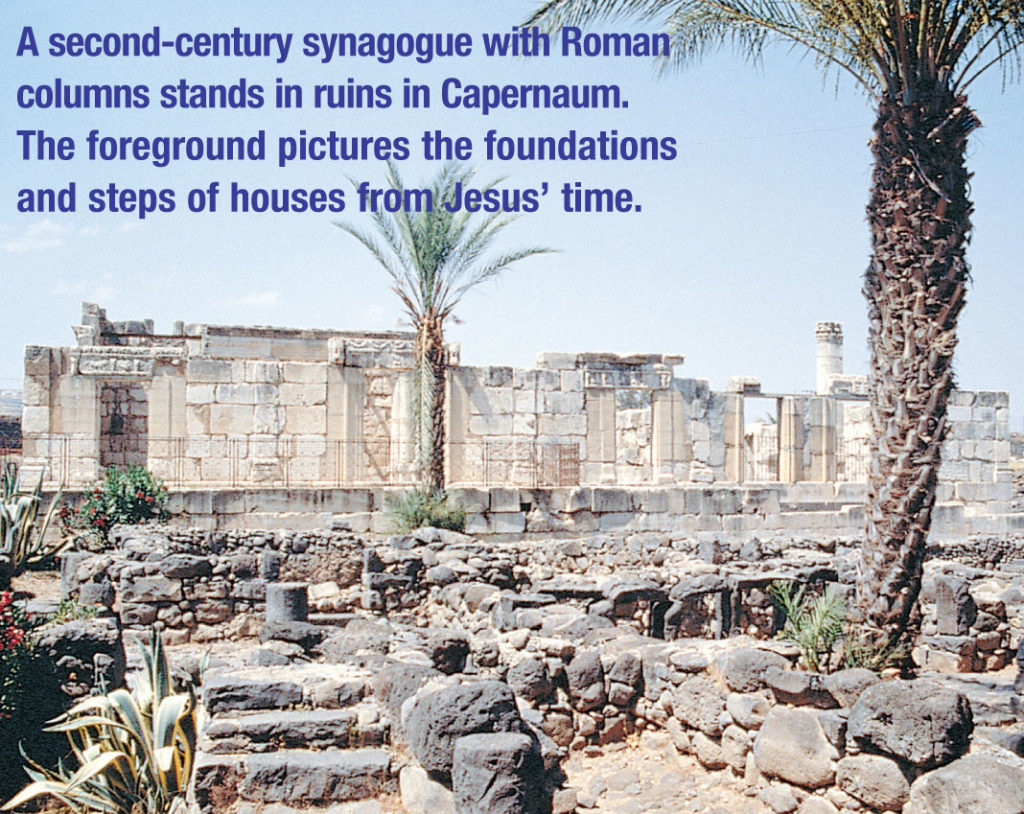
Jesus’ dynamic stride into ministry continues in Sunday’s gospel. With the disciples he called in last Sunday’s gospel accompanying him, he goes to Capernaum and preaches in the synagogue. Archeologists have unearthed the foundations of this synagogue beneath the floor of a later second-century synagogue.
What amazes those who hear Jesus preach is the authority he claims. He does not cite the legal precedents of the oral and written law as was apparently the practice of the scribes. Jesus’ teaching breaks legal boundaries. He challenges the law in a sense that amazes and attracts his hearers.
Then a man whom Mark characterizes as having “an unclean spirit” cries out in the synagogue. The word unclean has its origins in the temple.
The law keeps things with the potential to disrupt the holiness of the temple from coming in contact with the divine world the temple represents. The law calls such things unclean. They include certain animals, people when they have come in contact with the dead, women when they are menstruating or after giving birth.
The word unclean also developed a moral sense, identifying vices that distance one from God. The adjective unclean characterizes the man in the synagogue as outside the boundaries of the holy. His spirit represents danger in the narrative.
- Whose presence in your neighborhood scares you?
- Who gives you hope?
The first gospel writer, Mark, makes repeated claims about who Jesus is. The first verse proclaims Jesus is the messiah, the Son of God (1.1). At his baptism a voice from heaven identifies Jesus as God’s beloved Son (1.11). In Sunday’s gospel an unclean spirit acknowledges Jesus is the Holy One of God.
Jesus rebukes the unclean spirit, a word that means to silence, muzzle, or tie shut. The unclean spirit will not be Jesus’ herald. Jesus also rebukes the storm that endangers his disciples (4.39). He silences and calms two different endangering spirits — the unholy in a man and a violent wind in nature.
Both rebukes generate the same response in the narrative: amazed questions. In Sunday’s story the astonished people ask: “What is this new authoritative teaching? Who can command unclean spirits to obey?” In the storm, the disciples ask, “Who is this that the wind and sea obey him?” These rhetorical questions invite us readers to respond.
The disciples are the characters in the narrative that interest Mark. Only gradually do they appreciate who Jesus is. Their fear, failure, flight, and incomprehension make them ideal role models for readers who like them also fail and flee. Repeatedly the disciples ask and ponder the questions that every believer must answer for him- or herself. Mark presents fear and amazement as thresholds where faith begins.
- When has fear or amazement become a threshold of faith for you?
- What authority do you give Jesus’ teaching in your daily life?
All of us have the work of discerning the spirits that drive us. What possesses us? Ambition may drive us, the desire to achieve an advanced degree or a high paying job. Desire for security can possess us, a willingness to do whatever a boss asks in order to pay the mortgage and provide health benefits for the family.
Alcohol or chocolate or drugs can possess us, becoming a comfort in our stress or pain, more perfect and pliant than any human friend. Fear can stifle our creative selves or choke our voices.
The unclean spirits are right to ask Jesus if he has come to destroy them. The answer is yes. Through healing and forgiveness Jesus claims us for wholeness.
- Who clamors for attention in your community of faith? In your family? In your business? What possesses them?
- What clamors for attention in yourself? What erodes your wholeness or the wholeness you seek?
